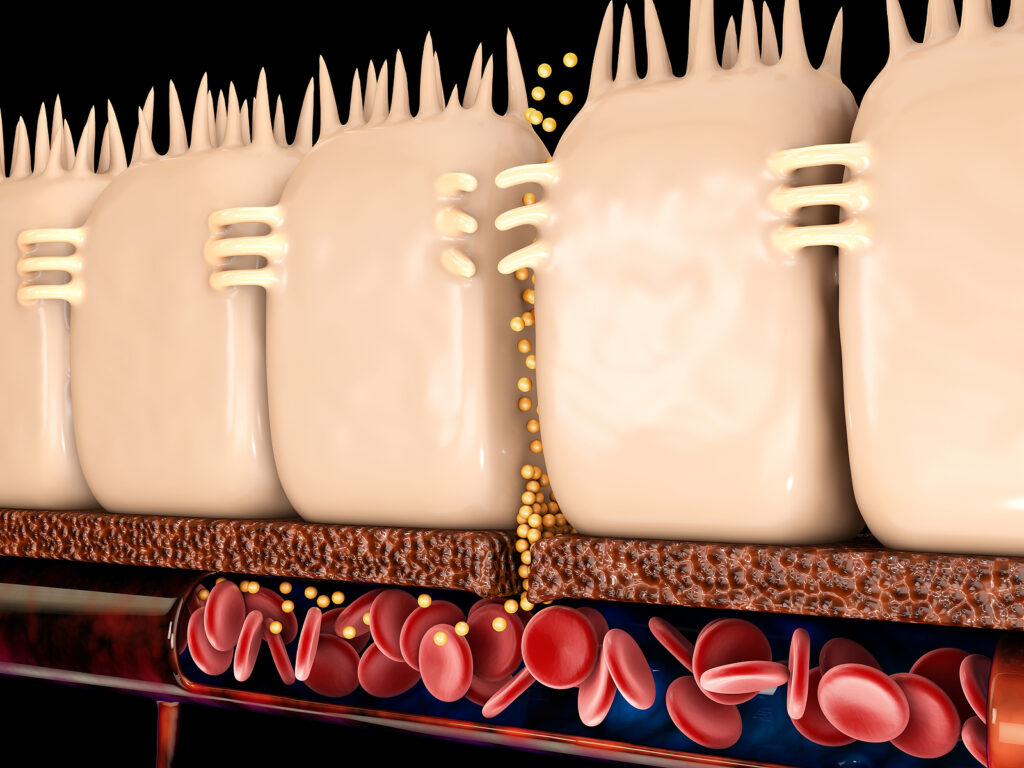
What is the Leaky Gut Diet and How Does It Work?
Your digestive system is a complex system that is designed to help absorb nutrients, break down food, and expel waste. Stretching about 30 feet from mouth to anus, your alimentary canal is an essential part of the digestive system that supports good health. For instance, your gut plays a key role in fighting off foodborne bacteria by “sterilizing” everything you eat with the active enzymes and digestive acids it secretes. Your gut also is in constant conversation with your immune system via receptors throughout the digestive tract, triggering the release of hormones and other cells that can help to promote general immune functions. One of the key components in your gut is the microbiome, comprising a community of bacteria intended to help fight disease and promote overall health.
“Leaky gut,” as it’s commonly known, is one of the most frequent conditions affecting the digestive system. Let’s take a closer look at leaky gut, the leaky gut diet, and other ways to help you better manage unpleasant symptoms and maintain good gut health.
What is Leaky Gut?
Your intestines are lined with an extensive, intricate lining of tissue that covers over 4,000 square feet of surface area when spread out. Normally in a healthy intestine, this lining forms a tight barrier that manages what gets absorbed into your bloodstream and what gets passed along to the large intestine and eventually excreted as waste.
Leaky gut, also sometimes known as increased intestinal permeability or intestinal hyperpermeability, is characterized by gut lining that may be full of holes, cracks, or other openings. These fissures allow partially digested food, bacteria, toxins, and other harmful negative elements to “leak” into the deeper tissues of your intestine and your bloodstream.
Symptoms of Leaky Gut
When the contents of your stomach and intestines leak into the bloodstream, the result is an alteration in the gut flora. Studies on leaky gut are still fairly new and constantly expanding, but there’s an understanding that changes to your gut’s bacteria can lead to some serious effects in your digestive tract and beyond.

The most common symptoms of leaky gut include:
- Gas and bloating
- Occasional constipation
- Occasional diarrhea
- Fatigue
- Nutritional deficiencies
- Allergies
- Headaches
- Skin issues
- Mood concerns
Early research suggests that over time leaky gut can lead to further health concerns.
What Causes the Holes in Your Gut?
We understand that leaky gut is caused by increased intestinal permeability, but research is still figuring out how that permeability happens. Some theorize that the junctions (a.k.a. “tight junctions”) that control what passes through the small intestine’s lining may fail allowing negative elements to enter the bloodstream and affect overall health with various health concerns.
Everyone has a leaky gut to some degree because your intestinal barrier isn’t supposed to be completely impenetrable. If it was, you wouldn’t get the vitamins, minerals, and macronutrients from the food you eat. Some people may be genetically predisposed to a leaky gut or may be more sensitive to sudden changes in the digestive system.
One of the biggest contributors to leaky gut is the modern Western diet, which tends to be low in fiber and high in sugar and saturated fats. This may trigger increased intestinal permeability. Lots of stress and heavy alcohol use can also disrupt the delicate balance in your gut flora and intestinal lining.
Testing for Leaky Gut
While study and finding solutions for leaky gut is still early, there are three main tests you can take to determine if you have leaky gut.
The Intestinal Permeability Test
The intestinal permeability test is a urine test that measures how well two non-digestible sugars (mannitol and lactulose) travel through the body and into your intestinal lining. During this test, you drink a solution containing the two sugars and, after six hours, provide a urine sample. The lab then measures the amount of lactulose and mannitol in your urine to determine if you have leaky gut and to what degree.
The Food Sensitivities Test
The food sensitivities test uses blood or saliva to determine your sensitivity to certain foods. The name of the test and the substance it actually tests for can vary from lab to lab. One test known as the intestinal barrier function test analyzes your blood and saliva to compare the number of antibodies in your system to the amount of yeast, bacteria, and common allergy-inducing proteins. Another similar test known as the food safe allergy test comprises a comprehensive evaluation of your blood and the presence of antibodies for 95 common foods. All forms of the food sensitivities test are designed to determine the foods that you should avoid, at least until intestinal permeability is returned to acceptable levels.
The Zonulin Test
The zonulin test is a test can be requested in conjunction with a food inflammation test. With the zonulin test, the lab measures the levels of zonulin in your stool or blood to determine the presence of intestinal hyperpermeability. Zonulin is a protein known to open up spaces between cells in your intestinal lining. Increases in zonulin break down the tight junctions between your intestinal cells, which can contribute to cracks, holes, and general permeability.
Zonulin release is mainly triggered by exposure to gluten or negative bacteria in the small intestine. Zonulin production may increase with exposure to gliadin, a type of protein found in wheat products.
The Leaky Gut Diet
The good news is that you can easily manage leaky gut and improve your gut health with some simple changes to your diet.
Remove harmful foods from your diet.
Start by removing allergens and other foods that may be causing intestinal inflammation, which may include processed grains, refined oils, dairy products, and any foods with added sugar.
Eat gut-healthy foods.
The leaky gut diet comprises a diverse range of foods that are easy to digest while actively helping to support the intestinal lining. Some foods you should include in your diet are:

- Bone broth – Bone broth is a rich source of collagen, proline, and glycine, all of which can help heal intestinal tissue.
- Fermented vegetables – Along with fiber, fermented vegetables contain acids that can help balance your intestinal pH and gut flora.
- Coconut – Coconut products contain medium-chain fatty acids that are easier to digest while providing you with healthy fats.
- Other healthy fats – Coconut, ghee, avocados, and egg yolk contain healthy fats that are easy to digest and help to promote healing in the gut.
- Sprouted seeds – Sprouted seeds include flax, chia, and hemp and offer excellent sources of fiber, which can help to feed your gut bacteria and support good digestion. However, if you have severe leaky gut symptoms, you may want to start with steamed vegetables and fruit for your fiber.
- Omega-3 fatty acids – Omega-3s are powerful anti-inflammatory compounds that are particularly found in fatty fish, grass-fed beef, lamb, and certain nuts and seeds.
Use supplements.
Along with foods, dietary supplements can help to rebalance your gut flora and digestive system. Probiotics are one of the most important supplements because they can help to replenish your gut flora with beneficial bacteria, which can further help to restore order to your digestive system. Try to get 50 to 100 billion CFUs (colony forming units) of probiotics in your diet per day.
You should also look into supplementing with digestive enzymes. These enzymes can help to ensure that foods are completely digested, which reduces the risk of large food particles and proteins from upsetting your intestinal lining.
Colostrum is a fluid produced by mammals in the first few days after giving birth before the appearance of true milk. It is packed with a variety of vitamins, minerals, protein, beneficial bacteria, and other nutrients that can help to support gut health while nourishing your body. Bovine colostrum has been shown in clinical trials to balance intestinal permeability. Its growth factors (hormones) work to restore the integrity of the tight junctions.
Leaky Gut Foods to Avoid
Much in the same way that certain foods may help reduce the risk of leaky gut, some foods may increase your susceptibility to fatigue, occasional constipation, and other leaky gut symptoms. In fact, any of the following foods may disrupt healthy gut bacteria and may lead to a leaky gut:
- Bread, pasta, cereals, and other wheat-based products
- Baked goods like cakes and muffins
- Cold cuts, deli meat, and other processed meats
- Potato chips, candy, and other types of junk food
- Alcohol
- Soda and other sugary beverages
- Foods that contain aspartame or other artificial sweeteners
- Foods that contain canola oil, sunflower oil, or other refined oils
One or more of the aforementioned foods may contribute to leaky gut symptoms, and so eliminating them is a good start. If symptoms don’t resolve or you believe your symptoms are signaling a more serious health problem, consult with a G.I. doctor (gastroenterologist). In doing so, you’ll gain medical insights into what might be causing these digestive problems and determine a safe, effective way to address them.
What Is an Healthy-Inflammatory Response Diet?
A healthy-inflammatory response diet consists of foods that help people guard against leaky gut and other digestive problems. The diet may help lower the issues typically associated with Leaky Gut.
Along with knowing leaky gut foods to avoid, it helps to consider a wide range of healthy foods to include in a healthy-inflammatory response diet. Foods known to support this diet include:
- Plant-Based Foods: Fresh fruits and vegetables are rich sources of antioxidants, which may help reduce cell damage caused by free radicals.
- Oily Fish: Tuna, salmon, and other oily fish often contain omega-3 fatty acids that may protect the heart and offer other health benefits.
- Fiber: Oats, beans, and other fiber-rich foods may help people normalize their bowel movements and maintain a healthy gut.
Before starting a healthy-inflammatory response diet, consult with a doctor or dietician. This allows you to get medical support and avoid implementing drastic dietary changes that otherwise may result in other health problems.
How Do Dietary Changes Impact Leaky Gut?
If a person is diagnosed with a leaky gut, this individual may need to evaluate leaky gut foods to avoid and integrate additional nutrient-rich foods in their diet. Over time, a myriad of dietary changes may help enhance your gut health.
Gradual dietary changes can make a long-term difference relative to leaky gut, particularly if you’re able to commit to a healthy diet long-term. As you make these small but significant modifications, you’re likely to feel a reduction in the otherwise unpleasant leaky gut symptoms.
In addition to dietary changes, strive to exercise and take other steps to maintain a healthy lifestyle. The combination of an exercise regimen and other healthy activities with dietary changes may help you feel more energized. Additionally, a reduction in leaky gut symptoms and improvements in the intestinal barrier just might improve the symptoms of issues you might attribute to leaky gut.
Finally, along with a healthy diet, make sure you find a constructive method of dealing with emotional stress. Excess stress can contribute to a leaky gut and disrupt other aspects of your physical and mood health. With the right diet, lifestyle, and daily colostrum supplementation, you may ward off leaky gut and improve your gut health. However, if lifestyle changes and stress management do not improve your leaky gut symptoms, check with your doctor.
Sources:
- https://www.healthline.com/nutrition/leaky-gut-diet#foods-to-avoid
- https://www.webmd.com/diet/anti-inflammatory-diet-road-to-good-health#1
- https://www.medicalnewstoday.com/articles/320233
- https://www.mayoclinic.org/healthy-lifestyle/nutrition-and-healthy-eating/in-depth/fiber/art-20043983
- https://www.medicalnewstoday.com/articles/301506
- https://www.medicalnewstoday.com/articles/326102
Read more on gut health and diet with the blog posts below:



